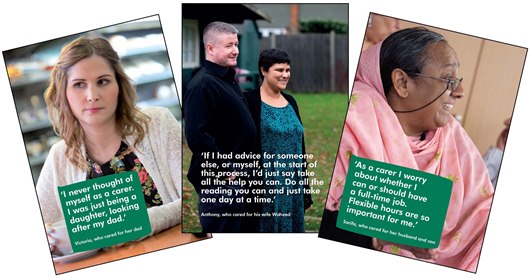Today is the start of Carers Week. In this blog, our editor Emma talks the different types of support available to you if you are looking after someone with cancer.
Living with cancer is not easy. But caring for someone with cancer can be a big challenge too – both practically and emotionally.
If you give unpaid support to someone who could not manage without your help, you may be a carer. This could be your family member, partner, friend, or neighbour. You might be doing their shopping or helping them to take their medicine. You could be helping them to wash or driving them to appointments. You may be doing this every day, or a few times a week. And you may not be the only carer – there may be a few people helping out. Caring can mean many things, and every situation is different.
But not everyone sees themselves as a carer. You may think you are just doing your bit to help, but recognising that you are a carer can be the first step in getting the support you might need. This Carers Week, we are talking about supporting carers to look after their loved ones well, and recognising that carers need support with their own needs too.

Practical support
As a carer, you may need to help the person you are looking after with everyday tasks, such as washing, dressing and cooking. You may need special equipment or an extra pair of hands to help with these tasks. It’s important to find out if you’re entitled to any help from social services – by having something called a carer’s assessment. You might be able to get money for equipment, help from a paid carer or respite care. If you cannot access this kind of help, think about asking family or friends to sit with the person you care for, just for a few hours. Or contact some voluntary organisations and charities to get more support. It’s so important to give yourself a break. Having some time for yourself can help you to relax and feel able to cope better, which can also help the person you’re caring for.
If you are also working, it’s important to know your rights at work. You have the right to ask for flexible working, which could mean working from home or working different hours.
Caring for someone can also affect your finances. If you are worried about money, there is support available. There are financial benefits and credits you may be able to get as a carer. You might also want to check whether the person you are looking after is entitled to any financial help.
Emotional support
Looking after someone you care about can cause many different feelings and emotions. Some people find that coming to terms with cancer brings them closer together. Others may find it very difficult. You’re probably having good days and bad days, and maybe arguing or getting frustrated. Trying to be open about how you feel can help both of you cope better and feel more in control. It’s important to remember that everyone’s experiences are different and there is no right or wrong way to cope.
We all have different support networks. Whether yours is your family, your partner, a friend or a social group, try to talk to someone about how you are feeling. You might find it easier to talk to someone you don’t know. Think about talking to a counsellor, joining a support group for carers, using our Online Community to chat with other carers online. Talking to other people going through similar things to you could really help.
More information and support
If you are looking after someone with cancer, we have information to help support you. We have advice about the practical, financial and emotional issues you might face as a carer, and suggest ways to cope with them. We also suggest ways you can take care of yourself.
Our information comes in a range of different formats, so you can choose the best format for you:
To see what else Macmillan's cancer information team has been blogging about, please visit our blog home page! You can subscribe to receive our blogs by email or RSS too.
We're with you every step of the way
The Macmillan team is here to help. Our cancer support specialists can answer your questions, offer support, or simply listen if you need a chat. Call us free on 0808 808 00 00.
Comments? Feel free to add them below (you need to be logged in).
Keep in touch Follow Macmillan’s cancer information team on Twitter @mac_cancerinfo
Whatever cancer throws your way, we’re right there with you.
We’re here to provide physical, financial and emotional support.
© Macmillan Cancer Support 2025 © Macmillan Cancer Support, registered charity in England and Wales (261017), Scotland (SC039907) and the Isle of Man (604). Also operating in Northern Ireland. A company limited by guarantee, registered in England and Wales company number 2400969. Isle of Man company number 4694F. Registered office: 3rd Floor, Bronze Building, The Forge, 105 Sumner Street, London, SE1 9HZ. VAT no: 668265007